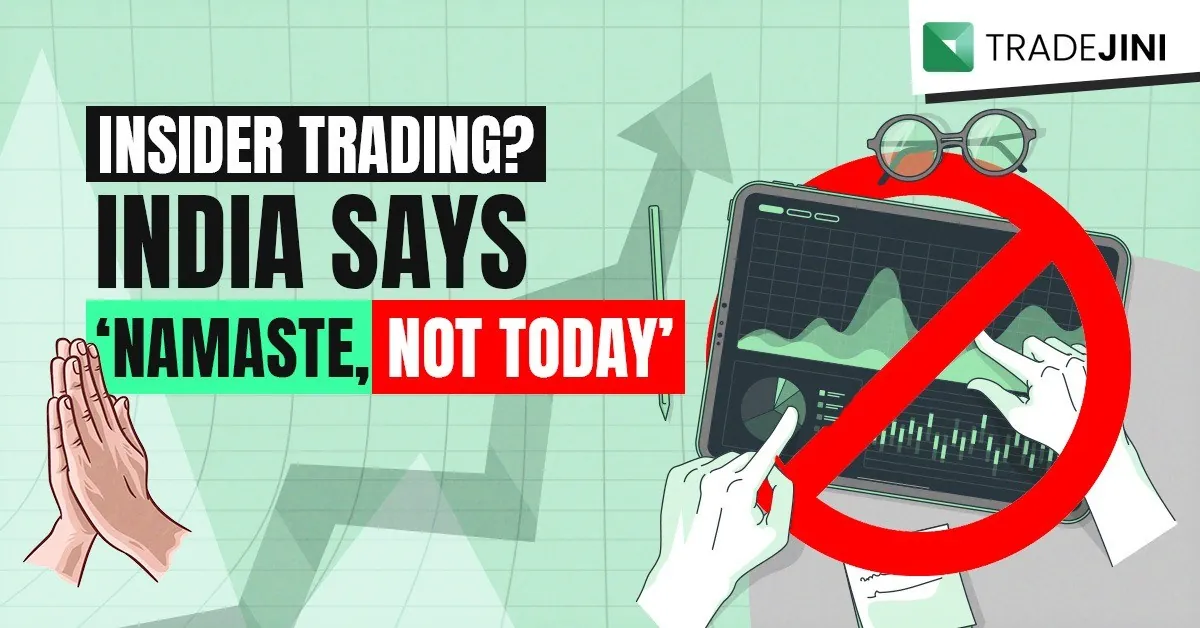Have you ever seen a movie or heard someone say, ‘That company's employee is going to call me and give me secret information?’
It’s called Insider trading (based on the related context). It is a method by which a listed company's employees trade and earn money illegally.
Yes, it's illegal.
Insider Trading Rules
Insider trading refers to the practice of using confidential or non-public information to make profitable trades in the financial markets. This practice is illegal, as it gives the insider an unfair advantage over other investors and traders who do not have access to non-public information, which undermines the integrity of the financial markets.
Non-public information refers to a corporate executive or someone in government who has access to an economic report before it is publicly released.
The rigged game
Insider trading can take various forms, but it typically involves an individual using confidential information to trade on the stock market. For example, Abhishek, who works as a financial analyst at a large corporation, has access to confidential financial information about the company. He knows that the company is about to announce a major merger that will significantly increase its profitability. Before the announcement is made public, Abhishek buys a large number of shares of the company's stock. After the announcement, the stock price jumps, and Abhishek sells his shares for a significant profit. This is an example of insider trading because Abhishek had access to non-public information and used it to trade the company's shares.
Another example of insider trading may involve an individual who has access to government information that is not yet public. For instance, Priya, who works for a Government company, may have access to economic data or policy decisions before they are publicly announced. She then uses this information to make investment decisions that give them an unfair advantage over other investors. She might make a profit, but it’s illegal, as it comes under insider trading.

Why is it illegal?
Insider trading is illegal in India because it violates the principles of fairness and transparency in the financial markets. The Securities and Exchange Board of India (SEBI) has strict regulations to prevent insider trading and protect investors from unfair practices.
Protecting the marketer’s heartbeat
To address insider trading activities, SEBI has implemented the Prohibition of Insider Trading Regulations, 2015. The regulations prohibit insider trading and provide guidelines for the prevention of insider trading. They also outline the procedures for investigation and enforcement, as well as the penalties for violations.
Insider trading in the land of the Taj
It is not easy to leak information as people get caught in insider trading. The Securities and Exchange Commission uses a variety of methods to uncover insider trading, including market surveillance and reports from self-regulatory bodies. Insider trading is also frequently uncovered through tips from informers who know about the trading or from those who have been caught and cooperate with government investigators.
Game of Skill or Crime of Greed
Raj Rajaratnam is a real-life insider trading case. Billionaire hedge fund manager Raj Rajaratnam, once a star of Wall Street, saw his world crumble in 2009. He was convicted of 14 counts of conspiracy and fraud related to a vast insider trading scheme. He was involved in illegal profits by swapping confidential tips with traders, hedge fund managers, and key employees of prominent companies like IBM, Intel Corp. and McKinsey & Co. His fortune turned to ashes in 2009 with his conviction for a vast insider trading scheme. Swapping confidential tips with insiders at companies like
IBM and Intel, Rajaratnam netted an estimated $60 million for his Galleon Group fund. After years of FBI investigations, he was arrested and sentenced to 11 years in prison.
Legal consequences
The legal implications of insider trading in India are severe and incur
significant legal and financial consequences, aiming to prevent and punish those who engage in such unethical activities. Those found guilty of insider trading may face a variety of consequences, including civil penalties.
Read On: Pied Piper to Prisoner: Rise and Fall of Harshad Mehta - The Big Bull
The Securities and Exchange Board of India (SEBI) has the authority to impose substantial fines on individuals or companies found guilty of insider trading. These fines can be several times the illegal gains made through the trade, making them a significant warning. Penalties vary based on the gravity of the offence, with a maximum of Rs 25 crores or three times the illicit profits received, whichever is higher.
Additionally, SEBI can impose trading restrictions and disqualify individuals from holding crucial corporate positions, effectively barring them from further market participation.

India's stand against insider trading
India's stringent insider trading regulations stand as a firm sentinel of its
commitment to a fair and transparent securities market. These regulations
protect investor confidence, attract foreign investment, and fuel the engine of economic growth. Companies, individuals, and investors all play a crucial role in upholding these regulations. Vigilance in reporting suspicious activity and responsible trading practices pave the way for a robust and thriving financial system where trust and integrity hold sway. Let us all act as guardians of this market, ensuring it remains a level field for all.
‘A secret trade leaves a bitter taste, so play fair’



